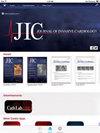Comparing upfront catheter-based thrombectomy with alternative treatment strategies for clot-in-transit.
IF 1.6
4区 医学
Q3 CARDIAC & CARDIOVASCULAR SYSTEMS
引用次数: 0
比较基于导管的前期血栓切除术和其他治疗策略,以治疗在途血栓。
在途血栓(CIT)死亡率很高,而最佳治疗策略仍不确定。本研究比较了导管血栓切除术(CBT)与其他治疗 CIT 的方法,包括抗凝、全身溶栓(ST)疗法和手术血栓切除术的疗效。我们对 2020 年 1 月至 2024 年 5 月间超声心动图记录的 CIT 患者进行了回顾性分析,这些患者均接受了前期紧急 CBT 治疗。我们将 CBT 队列的全因死亡率与已发表的荟萃分析中的抗凝、全身溶栓(ST)和手术血栓切除术的绩效目标死亡率进行了比较。我们的队列包括 26 名接受 CBT 的患者(平均年龄为 59.3 ± 17.9 岁,42.3% 为女性,57.7% 为黑人)。与荟萃分析中接受替代治疗的 463 名患者相比,CBT 组的短期死亡率明显降低(抗凝治疗为 7.7%,ST 治疗为 32.4%,手术血栓切除术为 23.2%)。CBT 不劣于抗凝(P < .001)、ST(P = .031)和手术血栓切除术(P < .001),优于抗凝(P = .0056)和手术血栓切除术(P = .036)。这项研究表明,CBT 是一种很有前景的 CIT 治疗方法。有必要进一步开展前瞻性研究来验证这些发现。
本文章由计算机程序翻译,如有差异,请以英文原文为准。
求助全文
约1分钟内获得全文
求助全文
来源期刊

Journal of Invasive Cardiology
CARDIAC & CARDIOVASCULAR SYSTEMS-
CiteScore
2.90
自引率
6.70%
发文量
214
审稿时长
3-8 weeks
期刊介绍:
The Journal of Invasive Cardiology will consider for publication suitable articles on topics pertaining to the invasive treatment of patients with cardiovascular disease.
 求助内容:
求助内容: 应助结果提醒方式:
应助结果提醒方式:


